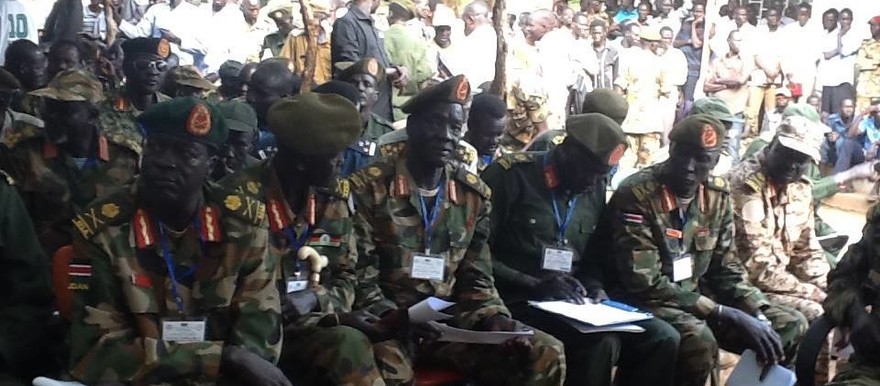Some delegates to the Sudan People’s Liberation Movement-In Opposition conference in Pagak, Upper Nile this week called for the dissolution of the SPLM and creation of new political parties.
“SPLM is a bloody party that has massacred its own people, lost popularity, vision, direction, and as such will never reunite its members and the entire nation of South Sudan,” said SPLM-IO Upper Nile Military Governor Gathoth Gatkuoth Hothnyang. “Therefore, the [Upper Nile] delegates recommend creation of a new party that may unite people of South Sudan as well as lead our liberation movement.”
The SPLM, founded in 1983 by the late John Garang de Mabior, has split into various factions during the current South Sudan Civil War.
The SPLM-Juba faction loyal to Salva Kiir controls the capital, national ministries, several governorships, and a remnant of the national army, the SPLA. The SPLM-IO loyal to Riek Machar commands a portion of the SPLA and holds territory in Jonglei, Unity, and Upper Nile states. The SPLM-G10, or former detainees, is an unarmed faction participating in the Addis Ababa peace talks.
In Pagak, the SPLM-IO diaspora delegation said the SPLM was “too deformed to be reformed.”
“SPLM/A is source of the current crisis,” they said. “Therefore it should be dissolved and a new party should be created which will represent value of the people of South Sudan.”
The Equatorian delegation said the SPLM was not a “genuine” political party, and blamed the current crisis on the lack of other political parties in South Sudan.
A statement by Henry Odwar, Michael Abate, and David Wilson Sebit said: “absence of credible and viable opposition parties, intolerance of other political views, [and] lack of political will and commitment to political pluralism/multi-party democracy” were root causes to the ongoing civil war.
Besides calls for dismantling the SPLM, there was a push to leave behind the SPLA, the former rebel militia turned national army. The Upper Nile and Unity delegations called for renaming the SPLA as the South Sudan Army or South Sudan Federal Army if the SPLA-Juba and SPLA-IO factions are eventually reconciled and reintegrated.
Rejection of Arusha Process
Some opposition delegations also rejected the “Arusha Process,” an intra-SPLM dialogue in Tanzania initiated by the SPLM-Juba aimed at reconciling the broken party.
“While delegates welcomed the intent of Intra-SPLM dialogue to address the root causes of the conflict, the meeting resolved to reject its purpose that may reunite the party, because the current civil war has become a national crisis rather than SPLM internal problem,” said Gatkuoth. “Other political parties have also been affected by the conflict and inclusivity is vital for achievement of sustainable peace and stability in South Sudan.”
The Equatorians called for a postponement of any intra-SPLM dialogue until after peace is signed. “The Intra-SPLM party dialogue has been overtaken by national events and the current crisis has moved beyond SPLM Party,” they said.
File photo: SPLM/A-In Opposition delegates in Pagak




